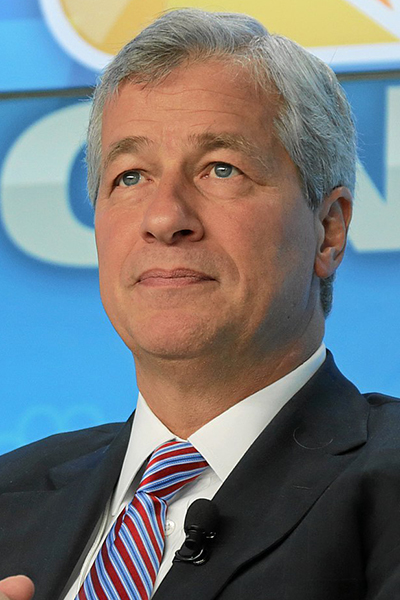World War III: Are We Already Living Through Its Opening Chapter?
In a world already strained by economic turbulence, social upheaval, and unprecedented technological change, a chilling new warning has emerged: World War III might not just be looming—it could already be here. This unsettling assertion comes from none other than Jamie Dimon, the CEO of JP Morgan, who recently took the stage at the Institute of International Finance to sound the alarm.
His message was unambiguous: the world must wake up to a brewing global conflict that ties together the violence in Ukraine and the escalating crisis in the Middle East. Dimon didn't mince words, describing a confluence of adversaries—Russia, North Korea, Iran, and China—as an "evil axis" poised to challenge Western alliances like NATO. "They are not talking about waiting 20 years," Dimon warned, emphasizing that the stakes are already high, with grave implications for international security and the global order.
Dimon’s Dire Warning: World War III Has Already Begun
Dimon’s declaration, “World War III has already begun,” sent shockwaves through political and financial circles alike. For the head of one of the world's most influential financial institutions to issue such a statement underscores the depth of concern over coordinated military moves and escalating tensions that threaten to ignite wider conflict.
Referencing the unsettling geopolitical landscape, Dimon urged the United States to remain vigilant, especially when it comes to Russia’s nuclear capabilities. "It is only a matter of time before these issues escalate in major cities worldwide," he cautioned, pointing to historical lessons that should serve as reminders of what happens when the world overlooks emerging threats. His speech was not just a call for attention but a clarion call for action, pressing global leaders to prioritize strategies for containment and conflict resolution before it’s too late.
The "Evil Axis": A Renewed Cold War Scenario?
To put this in perspective, Dimon's grouping of Russia, North Korea, Iran, and China as an “evil axis” evokes memories of Cold War rivalries but with more multifaceted challenges. Each of these nations plays a distinct role in the complex geopolitical puzzle. Russia, with its aggressive posture in Ukraine and nuclear brinkmanship, and China, with its military build-up and claims over Taiwan, are the most visible threats. Meanwhile, North Korea’s missile tests and Iran’s support for militant groups add more unpredictable elements to the mix.
The timing of Dimon's warning is significant. It coincides with Iran’s missile strikes on Israel, events that have pushed the Middle East further into turmoil. These actions are reverberating on the global stage, escalating the potential for widespread conflict.
A Scholar’s Perspective: Potential vs. Inevitable
Echoing Dimon’s concerns, Paul Beck, a seasoned political science professor at Ohio State University, weighed in on the conversation. Beck conceded that the risk factors highlighted by Dimon are very real but stopped short of claiming that a third world war is inevitable. He emphasized that the post-Cold War era, since its end in 1991, has been one of relative peace between superpowers, though this is now showing signs of strain.
“The past three decades have seen a stable, if fragile, peace between the U.S. and Russia,” Beck explained. “However, recent events in Ukraine and evidence of Russian interference in U.S. elections suggest that this equilibrium is under significant pressure.” Beck’s analysis offers a sobering reminder that the elements of war often simmer below the surface until a triggering event brings them to a boil.
The Trump Factor: A Prophecy of Catastrophe?
Former President Donald Trump added his voice to this escalating narrative, albeit with his trademark hyperbole. During a recent public appearance, Trump stated that the United States is “very close to a global catastrophe,” referencing Iran’s missile attacks on Israel. While some dismissed his comments as politically motivated, others noted that Trump's remarks align with broader concerns voiced by Dimon and analysts who warn of an impending shift in global power dynamics.
Why Dimon’s Warning Is Different
What sets Jamie Dimon’s warning apart is his position as a titan of industry rather than a politician or military analyst. When the CEO of JP Morgan—a figure with unique access to economic, political, and global market data—sounds the alarm, it’s more than headline fodder. It suggests that economic and political leaders alike are bracing for outcomes that could disrupt markets, supply chains, and international trade on an unprecedented scale.
What Does This Mean for the Global Economy?
The specter of an escalating global conflict raises dire questions for the economy. Financial markets, already jittery from inflationary pressures and fluctuating interest rates, would be especially vulnerable. Supply chains could face new disruptions, particularly if key shipping lanes or trade routes become conflict zones. Industries ranging from tech to energy would not escape unscathed.
Oil prices, which are often volatile during geopolitical crises, could skyrocket, worsening inflationary pressures worldwide. For everyday consumers, this could mean not only higher gas prices but also more expensive goods and services as costs ripple through supply chains. For investors, Dimon’s warning may be an unwelcome harbinger that signals a shift in portfolio strategies and global investment patterns.
Related: JPMorgan Chase CEO Jamie Dimon Reportedly Open to Role in Harris Administration
Related: CEO TODAY TOP 50
The Global Response: What Comes Next?
If Dimon’s ominous forecast proves even partially correct, world leaders must prioritize diplomacy, de-escalation, and strategic alliances to avert disaster. This involves strengthening alliances such as NATO while encouraging dialogue between adversaries where possible. However, the task is Herculean; balancing deterrence with diplomacy requires skillful, nuanced statecraft that many argue is currently in short supply.
There’s also the pressing need for public awareness. Citizens in Western countries, relatively insulated from the direct effects of foreign conflicts, must come to grips with the reality that today’s skirmishes could escalate into tomorrow’s crises. Dimon’s insistence that the world is already in the throes of a new kind of war is a wake-up call for everyone, not just policymakers and military strategists.
Preparing for an Uncertain Future
While not everyone agrees that we are already living through World War III, the conditions that Dimon describes paint an unnerving picture. The combination of regional conflicts, nuclear capabilities, and coordinated threats create a complex web that could ensnare the global community if not carefully managed. The stakes are clear: inaction or miscalculation could lead to consequences that go far beyond political posturing and economic sanctions.
Cautionary Warning or Overblown Claims?
Dimon’s statement may seem extreme, but it also serves as a crucial reminder of the interconnected nature of global events. Whether or not his prediction of World War III becomes a reality, his warning should prompt serious reflection on the world stage. With so many moving parts—from military maneuvers in Eastern Europe to rising tensions in the Middle East—the potential for a cascading series of conflicts cannot be ignored.
As history has shown, the world often ignores warning signs until they are too glaring to overlook. This time, with leaders like Dimon and analysts like Beck speaking up, there may be a chance to address these risks before they spiral out of control. The hope now lies in whether the global community can pivot from a state of reactive responses to proactive solutions before it’s too late.











